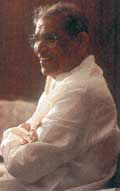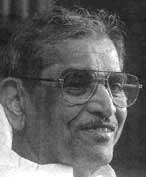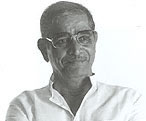- Home
- Archive -Sept 1996
- Divine Truth

Divine Truth
- In :
- Personal Growth
September 1996
By Suma Varughese
God within is the cornerstone of the philosophy of the 1997 winner of the Magsaysay Awards for community leadership, Pandurang Shastri Athavale. Drawing on jnana, bhakti and karma yoga, his Swadhyaya movement has become a formidable force for moral, social and economic change in society
 'Someone runs our body, gives us life, separates the oxygen from the air we breathe, gives us memory, sleep and energy. Therefore, not only does God exist, but he exists within us,' says Pandurang Shastri Athavale, or Dadaji as he is affectionately known, echoing the central philosophy of the Bhagavad Gita and the Upanishads. Athavale has made the indwelling or immanent God the foundation of his Swadhyaya movement. Swadhyaya literally means the study, knowledge or discovery of the Self or Atman, which makes the individual a part of the cosmic self and the manifestation of God within. It is God that imbues man with divinity, giving him a basis for self-respect. It also connects him to the rest of humanity and the universe. Started 50 years ago from Bombay, the five million-member Swadhyaya movement has become a formidable force in Gujarat and Maharashtra. Athavale has established a string of educational institutions, pioneered many ingenious wealth redistribution measures and instituted numerous social welfare schemes. An estimated 80,000 villages have so far come under the influence of Swadhyaya. The bestowal of the 1996 Magsaysay award for community leadership on the 76-year-old Athavale ('it is an award given to me by God,' he says gratefully) finally puts the spotlight on a man and a group that have been working selflessly and silently to transform Indian society at the grassroots level.
'Someone runs our body, gives us life, separates the oxygen from the air we breathe, gives us memory, sleep and energy. Therefore, not only does God exist, but he exists within us,' says Pandurang Shastri Athavale, or Dadaji as he is affectionately known, echoing the central philosophy of the Bhagavad Gita and the Upanishads. Athavale has made the indwelling or immanent God the foundation of his Swadhyaya movement. Swadhyaya literally means the study, knowledge or discovery of the Self or Atman, which makes the individual a part of the cosmic self and the manifestation of God within. It is God that imbues man with divinity, giving him a basis for self-respect. It also connects him to the rest of humanity and the universe. Started 50 years ago from Bombay, the five million-member Swadhyaya movement has become a formidable force in Gujarat and Maharashtra. Athavale has established a string of educational institutions, pioneered many ingenious wealth redistribution measures and instituted numerous social welfare schemes. An estimated 80,000 villages have so far come under the influence of Swadhyaya. The bestowal of the 1996 Magsaysay award for community leadership on the 76-year-old Athavale ('it is an award given to me by God,' he says gratefully) finally puts the spotlight on a man and a group that have been working selflessly and silently to transform Indian society at the grassroots level.  In the Swadhyaya villages, this transformation is even more evident. Chibubhai Patel, of a village in Valsad district of Maharashtra, India, explains that the concept of inborn divinity has changed the once bickering, wife-beating, liquor-quaffing men into model citizens with money in the bank and pucca houses. Athavale's philosophy of universal equality has also freed women to conduct friendship tours of neighboring villages, to teach the Swadhyaya philosophy and to realize their own potential. All this is indeed a fulfillment of Athavale's purpose 'to create a new man who pursues the divine mission in which God is at the center'. Athavale knows that individual transformation inevitably leads to social change. Bhakti (devotion), he says, can be turned into a social force. 'Since God is with us and within us, he is a partner in all our transactions. Naturally, he has his share...' God's part of our wealth, Athavale suggests, can be redistributed among the poor and needy. In farming communities, this is routed through Yogeshwar Krishi (Divine Farming), a scheme in which each family contributes to the purchase of land, and subsequently devotes one day a month for its cultivation. Seen as God's plot (3,500 of them already exist), the income thus generated is consecrated in the local temple (called Amrutalayam) and later disbursed to those in need, under cover of the night, as prasad or divine blessings. Fishing communities buy a common boat called Matsya Gandha (Floating Temple) instead of land. A larger version of the Yogeshwar Krishi is the Vriksh Mandir, where inhabitants of 20 adjoining villages devote one day a month to cultivating a fruit orchard of 10 acres or more. The idea is not just to provide for those in need, but also to forge friendly ties among the villages, thereby creating larger circles of universal brotherhood. Athavale has also set up a range of educational institutions�the Bal Sanskar Kendras, where children are instilled with a love of Indian culture and values through mythological tales, and the Tatvajnana Vidyapeeth at Thane, where students are taught Indian and western philosophy, comparative religion, and Vedic rites and rituals. Athavale has taught Sanskrit to illiterate villagers and trained many people of all castes in the Vedic rites of priesthood. Athavale was perhaps groomed for this mission by his father, Vaijnath Laxman Athavale Shastri, a Sanskrit scholar who ran the Srimad Bhagavad Gita Patshala at Madhav Bagh in Mumbai, India. Encouraged by his son's devotion to the Gita, Vaijnath started a special Sanskrit school for him where he learnt the Vedas, the Upanishads, the shastras or ancient texts, logic and philosophy till the age of 25. Then he spent another 12 years studying western knowledge at the Asiatic Library. But what made Athavale start the Swadhyaya movement was his participation in a conference in Hiroshima in 1954. His paper on the Gita as a solution for the malaise of modern civilization prompted a delegate to ask him if there was any community actually practising the word of the Gita. Athavale instantaneously decided that he would propagate the Gita philosophy.
In the Swadhyaya villages, this transformation is even more evident. Chibubhai Patel, of a village in Valsad district of Maharashtra, India, explains that the concept of inborn divinity has changed the once bickering, wife-beating, liquor-quaffing men into model citizens with money in the bank and pucca houses. Athavale's philosophy of universal equality has also freed women to conduct friendship tours of neighboring villages, to teach the Swadhyaya philosophy and to realize their own potential. All this is indeed a fulfillment of Athavale's purpose 'to create a new man who pursues the divine mission in which God is at the center'. Athavale knows that individual transformation inevitably leads to social change. Bhakti (devotion), he says, can be turned into a social force. 'Since God is with us and within us, he is a partner in all our transactions. Naturally, he has his share...' God's part of our wealth, Athavale suggests, can be redistributed among the poor and needy. In farming communities, this is routed through Yogeshwar Krishi (Divine Farming), a scheme in which each family contributes to the purchase of land, and subsequently devotes one day a month for its cultivation. Seen as God's plot (3,500 of them already exist), the income thus generated is consecrated in the local temple (called Amrutalayam) and later disbursed to those in need, under cover of the night, as prasad or divine blessings. Fishing communities buy a common boat called Matsya Gandha (Floating Temple) instead of land. A larger version of the Yogeshwar Krishi is the Vriksh Mandir, where inhabitants of 20 adjoining villages devote one day a month to cultivating a fruit orchard of 10 acres or more. The idea is not just to provide for those in need, but also to forge friendly ties among the villages, thereby creating larger circles of universal brotherhood. Athavale has also set up a range of educational institutions�the Bal Sanskar Kendras, where children are instilled with a love of Indian culture and values through mythological tales, and the Tatvajnana Vidyapeeth at Thane, where students are taught Indian and western philosophy, comparative religion, and Vedic rites and rituals. Athavale has taught Sanskrit to illiterate villagers and trained many people of all castes in the Vedic rites of priesthood. Athavale was perhaps groomed for this mission by his father, Vaijnath Laxman Athavale Shastri, a Sanskrit scholar who ran the Srimad Bhagavad Gita Patshala at Madhav Bagh in Mumbai, India. Encouraged by his son's devotion to the Gita, Vaijnath started a special Sanskrit school for him where he learnt the Vedas, the Upanishads, the shastras or ancient texts, logic and philosophy till the age of 25. Then he spent another 12 years studying western knowledge at the Asiatic Library. But what made Athavale start the Swadhyaya movement was his participation in a conference in Hiroshima in 1954. His paper on the Gita as a solution for the malaise of modern civilization prompted a delegate to ask him if there was any community actually practising the word of the Gita. Athavale instantaneously decided that he would propagate the Gita philosophy.  Early on, he defined his vision for Swadhyaya: 'We shall create a society which is self-disciplined, has faith in God, is adventurous and brave, loves culture and the holy scriptures, is truly democratic and is filled with devotion. 'In this society, greater importance will be given to right attitude rather than to action, thoughts will be valued more than things, feelings more than enjoyment, self-surrender more than selfishness, group more than individual, culture more than manners, efforts more than results, goodness more than strength, truth more than mere logic and righteousness more than wealth.' Starting with bhakti pheris (devotional tours) conducted by a core team of 19, the movement gradually overcame initial resistance and has since grown naturally and inevitably. Will the movement sustain its ideals and momentum without Athavale? Well, the group has already identified its future leader: his daughter, Dhanashree, whose philosophical orientation and leadership qualities equip her for the task. But the Swadhyayees' final comfort comes from its philosophy: 'If God wants it to survive, it will,' they say. They are, in turn, following Athavale's advice: 'Only if there is complete self-surrender to God's will and purpose, will this work prosper.'
Early on, he defined his vision for Swadhyaya: 'We shall create a society which is self-disciplined, has faith in God, is adventurous and brave, loves culture and the holy scriptures, is truly democratic and is filled with devotion. 'In this society, greater importance will be given to right attitude rather than to action, thoughts will be valued more than things, feelings more than enjoyment, self-surrender more than selfishness, group more than individual, culture more than manners, efforts more than results, goodness more than strength, truth more than mere logic and righteousness more than wealth.' Starting with bhakti pheris (devotional tours) conducted by a core team of 19, the movement gradually overcame initial resistance and has since grown naturally and inevitably. Will the movement sustain its ideals and momentum without Athavale? Well, the group has already identified its future leader: his daughter, Dhanashree, whose philosophical orientation and leadership qualities equip her for the task. But the Swadhyayees' final comfort comes from its philosophy: 'If God wants it to survive, it will,' they say. They are, in turn, following Athavale's advice: 'Only if there is complete self-surrender to God's will and purpose, will this work prosper.'
To read more such articles on personal growth, inspirations and positivity, subscribe to our digital magazine at subscribe here
Life Positive follows a stringent review publishing mechanism. Every review received undergoes -
- 1. A mobile number and email ID verification check
- 2. Analysis by our seeker happiness team to double check for authenticity
- 3. Cross-checking, if required, by speaking to the seeker posting the review
Only after we're satisfied about the authenticity of a review is it allowed to go live on our website
Our award winning customer care team is available from 9 a.m to 9 p.m everyday
The Life Positive seal of trust implies:-
-
Standards guarantee:
All our healers and therapists undergo training and/or certification from authorized bodies before becoming professionals. They have a minimum professional experience of one year
-
Genuineness guarantee:
All our healers and therapists are genuinely passionate about doing service. They do their very best to help seekers (patients) live better lives.
-
Payment security:
All payments made to our healers are secure up to the point wherein if any session is paid for, it will be honoured dutifully and delivered promptly
-
Anonymity guarantee:
Every seekers (patients) details will always remain 100% confidential and will never be disclosed
